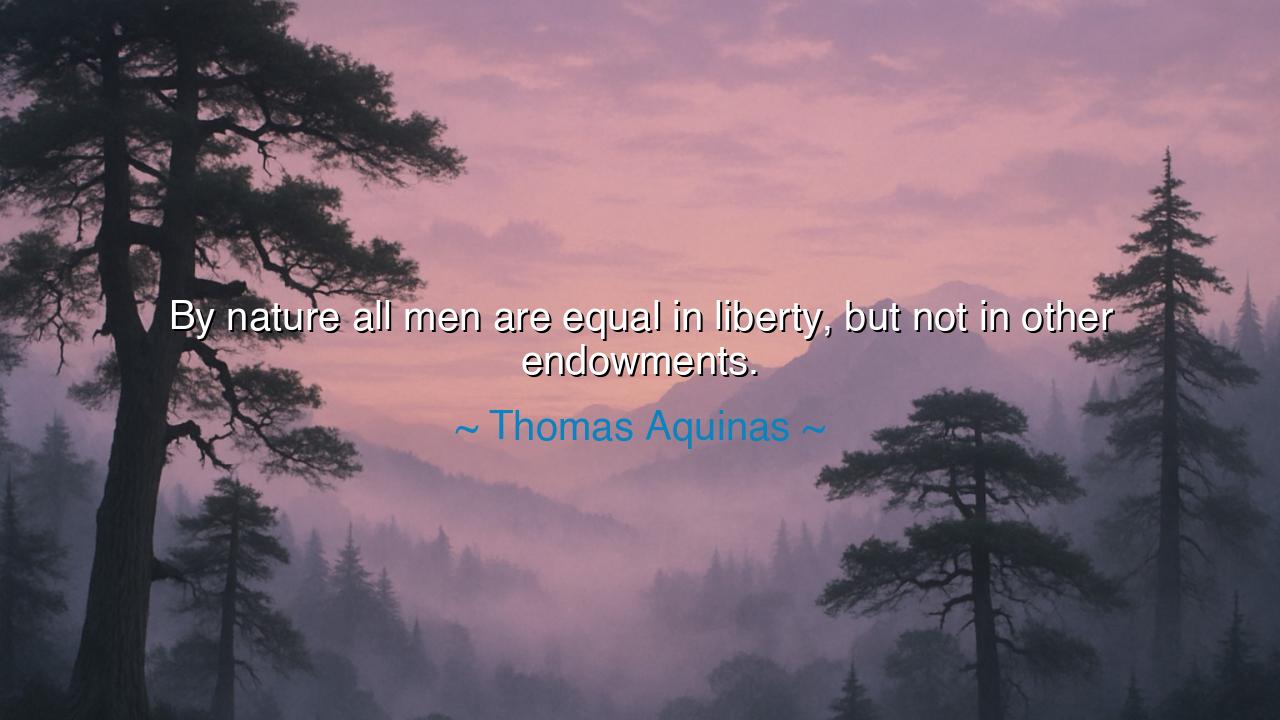
By nature all men are equal in liberty, but not in other






In the great expanse of human history, from the dawn of time to the present day, the question of equality has always burned at the heart of the human spirit. What does it mean to be equal? Is it to be the same, or is it to have the same opportunities? Thomas Aquinas, that profound scholar and theologian, in his timeless wisdom, spoke of a truth that resonates across the centuries: "By nature all men are equal in liberty, but not in other endowments." In these words lies the foundation of human dignity—the recognition that while all people share the same right to freedom, they are not born with identical gifts, abilities, or circumstances. This is a powerful truth, one that calls us to embrace both the commonality and the uniqueness of each individual.
Aquinas, in his pursuit of understanding, knew that liberty is the cornerstone of human flourishing. To be free is to be born into the potential of one’s own life, to chart a course without the chains of oppression or coercion. This is the very essence of what it means to be human. The ancients, too, understood this truth. Plato, in his dialogues, spoke of the philosopher-king who rules with wisdom and justice, recognizing the inherent worth and dignity of every individual. For Plato, as for Aquinas, freedom was not just a political ideal, but a natural right—a gift bestowed upon all people. The moment we are born, we are born into the liberty to seek our path, to strive for what we can become, to carve out our place in the world.
However, as Aquinas wisely reminds us, while liberty is a shared gift, not all men are endowed with the same talents, the same strength, the same wisdom. The world, as we know it, is not one of perfect equality in ability or circumstance. Consider the great rulers of history—Alexander the Great, whose conquests stretched across continents, or Leonardo da Vinci, whose mind created masterpieces that still awe the world. Were they not born with gifts that set them apart? Yet, in the eyes of Aquinas, their extraordinary gifts did not make them inherently more worthy of liberty than the common man. Each, regardless of his talents, was granted the same right to freedom, the same opportunity to choose his course in life.
The truth of Aquinas’s statement becomes clear when we consider the diversity of human experience. In the ancient world, a slave could possess great intellect and wisdom, yet be born into a condition of servitude. The philosopher-king, on the other hand, might be born into privilege, surrounded by wealth and power, yet his soul would be no more or less valuable than that of the humble artisan. Liberty, in its purest form, recognizes the inherent worth of every person, regardless of their outward circumstances or abilities. Yet, as we know, life is not always fair, and some are born with advantages—physical strength, intellectual brilliance, or the fortune of birth—that others can only dream of.
Consider the example of Socrates, who, despite being a humble man, became one of the greatest philosophers the world has ever known. Socrates was not born into wealth or power, yet through the exercise of his mind and his liberty to question and seek truth, he changed the course of history. In contrast, many men born into privilege or with talents they never nurtured faded into obscurity. Socrates’s greatness did not lie in his birth or in any inherent advantage, but in his freedom to think and challenge the status quo. This is where the heart of Aquinas’s wisdom lies: no matter who we are, no matter what we are born with, we are all granted the freedom to shape our lives according to our choices.
In the world today, we see this ancient truth reflected in the struggles and triumphs of individuals across the globe. While some are born into wealth and privilege, others must fight for the basic rights of freedom and self-expression. Yet, it is through the exercise of this liberty—the ability to choose one’s path—that we find true equality. It is not the gifts we are born with that determine our value, but the freedom with which we can pursue our purpose and potential. The great leaders and thinkers of history were not chosen for their natural endowments, but for their ability to use their liberty to affect change, to challenge the world around them, and to create a legacy that transcends time.
The lesson, then, is both simple and profound: freedom is the birthright of all. We may not all be born with the same endowments, the same abilities, or the same circumstances, but we are all born with the right to shape our own lives. In a world that often measures success by wealth or physical prowess, let us remember that the true measure of a person is not in their gifts, but in how they use their freedom to create meaning in their lives. Let us honor the liberty of every person, and in doing so, we will honor the dignity of the human spirit, which, in the end, is the only true equality that matters.






AAdministratorAdministrator
Welcome, honored guests. Please leave a comment, we will respond soon